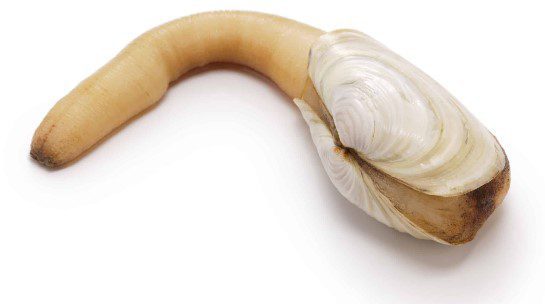

Geoduck is a popular type of large saltwater clam that is known for its long siphon used to filter plankton and small organisms. It is rich in essential proteins and vitamins, plus low in fat, and an excellent source of minerals, vitamins, and omega-3 fatty acids. Despite its potential nutritional benefits, risks associated with consuming geoduck can include bacteriological and toxic contamination that can cause chronic health issues in dogs.
Geoduck is high in protein and low in fat, and a good source of minerals such as zinc, potassium, iron and selenium, as well as vitamins B12 and B3. The clam also has omega-3 fatty acids, which have been linked to reducing inflammation, improving heart health, and promoting a healthy skin and coat.
Raw geoducks may contain parasites, bacteria, viruses, or other contaminants that can lead to health issues in dogs. Eating contaminated shellfish can cause digestive upset, vomiting, and diarrhea. In severe cases, it can lead to chronic illness or even death. Additionally, the filter-feeding nature of geoducks means they can contain biotoxins that can cause paralytic shellfish poisoning in dogs, which can lead to vomiting, unstable gait, weakness, and excessive drooling.
When sourcing geoduck, make sure to find a reliable supplier who follows strict food safety standards. The food should be consumed immediately after purchasing, or stored at temperatures below 4°C. Wash the geoduck thoroughly to remove any sand or debris, then cook by steaming, boiling, blanching, or stir-frying (without seasoning) to serve safely. Geoduck should be served in small amounts occasionally as a treat.
Geoduck is a large, saltwater clam with a long siphon, also commonly known as the “King Clam” or “elephant trunk clam”. It is native to coastal waters across the Northern Pacific Ocean, from California to the Aleutian Islands in Alaska. Despite its potential nutritional benefits, it has a number of risks associated with its consumption in dogs. Geoduck is rich in essential proteins, vitamins, minerals, and omega-3 fatty acids, which all provide a range of health benefits for your pup. However, it may contain parasites, bacteria, viruses, or other contaminants that can lead to chronic illnesses or even death. Additionally, it can also contain toxic biotoxins that can cause paralytic shellfish poisoning in dogs.
When sourcing geoduck, it is important to find a reliable supplier to ensure its safety. It should be consumed immediately after purchasing, or stored at below 4°C. Geoduck can be cooked in several ways such as steaming, boiling, or blanching (without seasoning), and served in small amounts as a treat. Other alternatives to geoduck include boiled fish or watered-down canned fish such as tuna or sardines, both of which are an excellent source of omega-3 fatty acids and protein.
Do all dogs need omega-3 fatty acids in their diet? Yes, omega-3 fatty acids are an essential part of a balanced diet as they are necessary for a healthy coat, joint function, and a strong overall immune system.
Has your pup ever tried geoduck? What did they think? Share your experiences in the comments below!
No matter what kind of treat you choose to give your pup, make sure to choose something that is healthy, safe, and nutritionally balanced. Treat your furry friend with some geoduck or other delicious alternatives and enjoy the happy moments together!